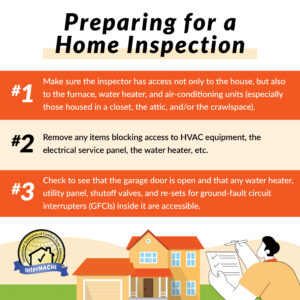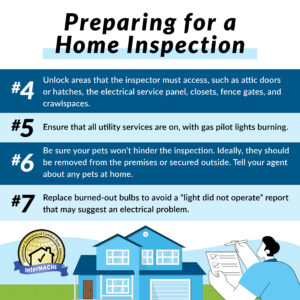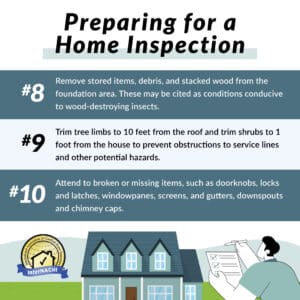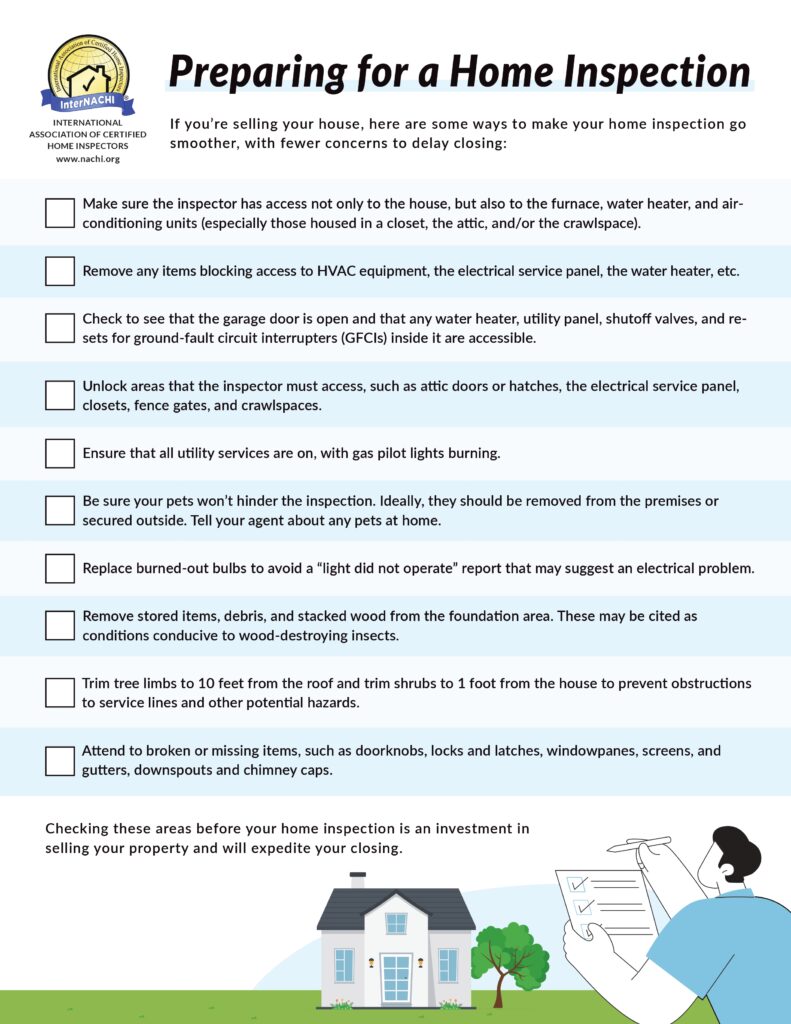
Quick Summary:
Want your home inspection to go smoothly and your report to look its best? Start by securing pets, clearing access to all major systems, and tackling simple maintenance items. Clean spaces, working windows, and unlocked areas make a big difference. This blog outlines 10 easy steps to help sellers prep for inspection day—and make a great impression on potential buyers.



1. Secure or Remove Pets
Although you love your pets, visitors—including the inspector and the potential buyer—might not share that comfort level. Even the friendliest pet can act out of character when strangers enter the home. For everyone’s safety and peace of mind, it’s best to remove or securely crate pets during the inspection.
Let your real estate agent know if any pets will remain in the home so they can notify the inspector ahead of time.
2. Clean the Home—Including Pet Messes
A tidy home sets a positive tone. A quick clean—especially of high-touch areas like kitchens and bathrooms—helps the inspector move more efficiently. It also avoids unnecessary distractions for the buyer.
Don’t forget to clean up after pets in the yard. A neat lawn makes a stronger impression and reduces the risk of unpleasant surprises.
3. Ensure Access to All Areas
Home inspectors are not permitted to move personal items to access areas like attics, electrical panels, or HVAC equipment. Clear the path to all major systems, including the furnace, crawlspace, water heater, attic, and service panels. Also unlock detached buildings, closets, and crawlspace entries.
Inspectors follow strict guidelines like those outlined in the InterNACHI Standards of Practice, so access is crucial for a complete report.
4. Clear Off Appliances
Your oven, stove, dishwasher, and microwave will be tested during the inspection. Clear these surfaces and interiors to avoid delays—or worse, accidental damage. An inspector cannot be responsible for items left inside an appliance during operation.
5. Tackle Minor Maintenance Items
Take care of the easy fixes now. A blown lightbulb, missing outlet cover, or dripping faucet might seem small, but it can create a long list of minor defects that add unnecessary weight to the inspection report.
Replace smoke detector batteries, furnace filters, and repair any minor plumbing leaks or cracked windows. These proactive steps show your home has been well-maintained.
6. Remove Decorations from Windows and Toilet Tanks
Inspectors will open every window and toilet tank lid. While decorative items are lovely, they’re also easily damaged or may get in the way. Remove anything breakable or in the path of inspection to ensure full access and avoid any disclaimers like “not inspected” in your final report.
7. Prep Windows and Window Coverings
Make sure all your windows open properly and are accessible. Open blinds or curtains to allow natural light in and give inspectors visual access to window components. A quick test of the windows ahead of time can help you identify any that stick, don’t latch, or are cracked.
For more about how inspectors assess systems and components, check out The Building Center, a helpful resource for understanding what’s inspected.
8. Leave a Note or Maintenance Records
If there are quirks to your home, or you’ve had recent repairs or upgrades done, leave a note or folder on the kitchen counter. This might include HVAC service receipts, new roof installation records, or warranties on appliances.
Buyers appreciate transparency, and sharing maintenance history builds trust.
9. Give the Buyer Some Space
It’s common for sellers to vacate the property during the inspection. This allows buyers to speak openly with the inspector and ask questions without feeling uncomfortable.
If you must be home, remain out of the way and available for questions, but avoid hovering. This demonstrates respect and cooperation, which goes a long way in keeping negotiations smooth.
10. Let the Inspector and Buyer Review Privately
The final walkthrough with the inspector is a critical time for buyers. They’ll review findings, ask questions, and discuss next steps. It’s best for sellers and agents to step away during this portion to allow honest conversation and decision-making without pressure.
For more on what Indiana inspectors are licensed to do, review the Indiana Home Inspector Licensing Board.
Value in Preparation
The effort you put into preparing your home helps create a cleaner report, a smoother closing, and a stronger impression. A well-prepared home shows pride of ownership and can influence how a buyer responds to the inspection results.
At Champion Property Inspection, we’re here to support both sellers and buyers through a seamless inspection process. Our experience with over 5,500 inspections means we know what matters—and how to help you prepare for success.
Ready to Schedule?
If you’re preparing to sell or need a pre-listing inspection, schedule with Champion Property Inspection today. Our licensed team delivers detailed, timely reports with unmatched customer service and local expertise.
Call us or book an inspection online to get on the schedule and make your next move with confidence!

